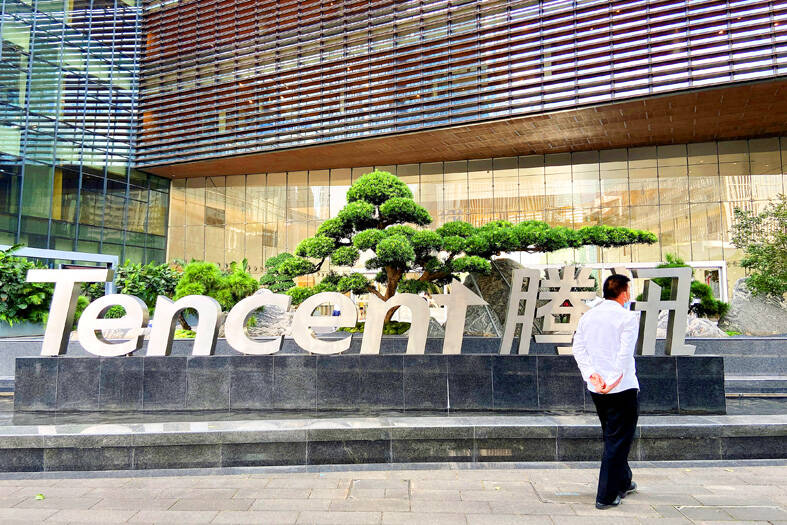Chinese tech giant Tencent Holdings Ltd’s (騰訊) revenue fell 2 percent year-on-year in the third quarter, the company said in a statement yesterday, as Beijing’s regulatory crackdown on video games and the tech sector hit its business.
The Hong Kong-listed company, which is the world’s top video game maker and the owner of popular app WeChat, posted revenues of 140.1 billion yuan (US$19.8 billion) in the third quarter, compared with the average projection of 141.4 billion yuan.
Net income came in at 39.9 billion yuan, versus the 25.2 billion yuan estimate.

Photo: Reuters
It is Tencent’s second consecutive quarterly decline in revenue, as the company grapples with tightened regulations.
The company said that domestic video games in particular saw a 7 percent decrease in the three months ending Sept. 30, “as transitional industry challenges resulted in lower-paying user counts.”
Profit attributable to equity holders was up 1 percent in the third quarter, with the company saying it had implemented “business rationalization and cost efficiency initiatives.”
Tencent said it had cut costs in its cloud service projects and also “more tightly controlled” content costs for online advertising.
It announced in a separate statement that it would distribute the majority of its stake in food delivery company Meituan (美團) to shareholders.
It made the decision because it judged that Meituan had now “attained a robust level of financial strength, industry positioning and investment returns,” Tencent said.
The tech giant appeared to have laid off a number of employees in the third quarter, as its payroll shrank by more than 1,800 employees between June and the end of September, stock exchange filings showed.
The Shenzhen-based company has increasingly turned to overseas business, particularly in Europe.
The group bought British game studio Sumo Group PLC for US$1.3 billion last year and increased its stake in French studio Ubisoft SA in September.

With an approval rating of just two percent, Peruvian President Dina Boluarte might be the world’s most unpopular leader, according to pollsters. Protests greeted her rise to power 29 months ago, and have marked her entire term — joined by assorted scandals, investigations, controversies and a surge in gang violence. The 63-year-old is the target of a dozen probes, including for her alleged failure to declare gifts of luxury jewels and watches, a scandal inevitably dubbed “Rolexgate.” She is also under the microscope for a two-week undeclared absence for nose surgery — which she insists was medical, not cosmetic — and is

CAUTIOUS RECOVERY: While the manufacturing sector returned to growth amid the US-China trade truce, firms remain wary as uncertainty clouds the outlook, the CIER said The local manufacturing sector returned to expansion last month, as the official purchasing managers’ index (PMI) rose 2.1 points to 51.0, driven by a temporary easing in US-China trade tensions, the Chung-Hua Institution for Economic Research (CIER, 中華經濟研究院) said yesterday. The PMI gauges the health of the manufacturing industry, with readings above 50 indicating expansion and those below 50 signaling contraction. “Firms are not as pessimistic as they were in April, but they remain far from optimistic,” CIER president Lien Hsien-ming (連賢明) said at a news conference. The full impact of US tariff decisions is unlikely to become clear until later this month

GROWING CONCERN: Some senior Trump administration officials opposed the UAE expansion over fears that another TSMC project could jeopardize its US investment Taiwan Semiconductor Manufacturing Co (TSMC, 台積電) is evaluating building an advanced production facility in the United Arab Emirates (UAE) and has discussed the possibility with officials in US President Donald Trump’s administration, people familiar with the matter said, in a potentially major bet on the Middle East that would only come to fruition with Washington’s approval. The company has had multiple meetings in the past few months with US Special Envoy to the Middle East Steve Witkoff and officials from MGX, an influential investment vehicle overseen by the UAE president’s brother, the people said. The conversations are a continuation of talks that

CHIP DUTIES: TSMC said it voiced its concerns to Washington about tariffs, telling the US commerce department that it wants ‘fair treatment’ to protect its competitiveness Taiwan Semiconductor Manufacturing Co (TSMC, 台積電) yesterday reiterated robust business prospects for this year as strong artificial intelligence (AI) chip demand from Nvidia Corp and other customers would absorb the impacts of US tariffs. “The impact of tariffs would be indirect, as the custom tax is the importers’ responsibility, not the exporters,” TSMC chairman and chief executive officer C.C. Wei (魏哲家) said at the chipmaker’s annual shareholders’ meeting in Hsinchu City. TSMC’s business could be affected if people become reluctant to buy electronics due to inflated prices, Wei said. In addition, the chipmaker has voiced its concern to the US Department of Commerce